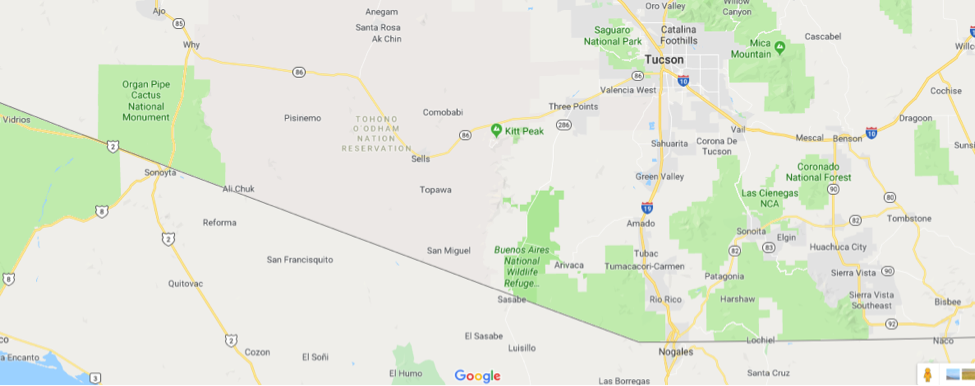Photo courtesy of Emily Rodden via Google Maps.
Eight humanitarian volunteers have been charged with federal crimes. Their trial started on Jan. 15, 2019.
This trial could set the precedent for letting future humanitarian aid into National Wildlife Refuges along the Arizona/Mexico Border. I was at their trial and the rally. This is what I experienced.
A large majority of the border south of Tucson is either National Wildlife Refuge or the Tohono O’Odham Nation Reservation
My day started on the street corner across the street from the U.S. District court where the eight volunteers were being tried. On the morning of Jan. 15, “No More Deaths” had a press conference. I did not attend the press conference, so I can’t say much on this.
I got there around 10 a.m. and I started my morning holding a sign that read, “Humanitarian Aid is Never a Crime… Drop The Charges.” I was informed the court room was full. So, I stood on the side of the road until 1 p.m. and then the trial took a lunch break. So, everyone in the court house came out. “No More Deaths” provided lunch to all the volunteers, which was really nice.
After lunch, I decided to head into the courthouse to see if I could get into the courtroom. In the courtroom the judge was sitting in front of an American flag, which I thought was ironic.
America, the land of the migrants, the land of the American Dream, but in the same courthouse three floors below 50-70 migrants were being sentenced to detention and deportation.
The trial I saw started with the plaintiff’s call to stand.
Two Fish and Wildlife officers stood.
One that arrested the eight volunteers and one that just worked in Cabeza Prieta Wildlife Refuge.
These two officers seemed oblivious to the fact that people were even going missing and dying in Cabeza Prieta every year and they didn’t seem to really care either—which was upsetting. These two officers talked about these distress beacons within Cabeza Prieta, which are reportedly five to ten miles apart each. Five to ten miles can take hours on foot. If a migrant is dehydrated and experiencing hyperthermia, how realistic is it that they will make it to one of these distress beacons. A bunch of bureaucratic mess was the plaintiff’s case, in my opinion.
The defense called to the stand …
Greg Hess, the chief medical examiner of Pima County, talked about the amount of deaths of undocumented migrants every year in Pima county. He said that people aren’t dying because of dehydration but being dehydrated can accelerate things like heat stroke and hyperthermia, which do kill people.
At this point the Judge said something along the lines of, “This trial is not about the government’s obligation,” which I thought was interesting because I thought it was the government’s obligation to make the process of migration easy for ALL people trying to enter this country.
I thought it was the government’s obligation to grant asylum to refugees seeking asylum.
I thought it was the government’s obligation to allow humanitarian aid in National Wildlife Refuge’s where people are dying.
But that’s just me.
The next person brought to the stand was John Fife.
John Fife was the pastor at Southside Presbyterian Church in Tucson and he took us to church and school at the same time. He was the spiritual guider to “No More Deaths” because “No More Deaths” was started out of Southside Presbyterian.
He talked about the obligation, as a spiritual leader, he felt to open his church to people in his community that were refugees fleeing death squads, torture chambers and fleeing for their lives and their families lives.
He also discussed the U.S. government’s choice to not recognize these people as political refugees and that he had no choice but to protect these people from capture, detention and deportation.
He related his work to that of the abolitionist movement and how the abolitionists were seen on the right side of history. The people who provided sanctuary to those in need were seen as the one’s upholding the faith.
The trial ended with John Fife telling the people in the courtroom about the Christian obligation to “Love the outsider as you would yourself” and that we are commanded to “love without expectation, unconditionally and unequivocally.”
Emily Rodden is a third-year student majoring in anthropology. ER861398@wcupa.edu

